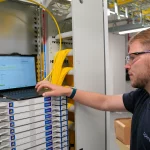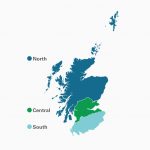Scotland and UK Gov Told to STOP Squabbling Over Broadband UPDATE
Asking politicians to stop arguing is a bit like telling the sky to rain during a drought, but a new report from the Scottish Affairs Committee (SAC) has told the UK and Scottish Government’s to end their “disharmony” and “intense political disagreement … about the rollout of broadband in Scotland.”
The £428m Digital Scotland (DSSB) project with BT (Openreach), which have deployed a mix of their ‘up to’ 80Mbps capable Fibre-to-the-Cabinet (FTTC / VDSL2) and a small bit of Gigabit capable Fibre-to-the-Premises (FTTP) technology (not to mention separate commercial deployments from Virgin Media etc.), has so far succeeded in helping to extend “superfast broadband” (30Mbps+) coverage to over 93% of Scotland (here).
Overall the the DSSB project has covered a total of 890,000 premises and the programme is expected to continue to deploy during 2018 thanks to various extension arrangements. Across the country around 4,400 new FTTC street cabinets are now live and more than 9,700km of cable has been laid, including 400km for subsea cabling, by engineers from Openreach.
Advertisement
The Scottish Government are now developing their £600m R100 programme, which aspires to make superfast broadband networks available to “every single premise in Scotland” by the end of 2021 (here and here) or March 2022 as a financial year. Several suppliers including BT, Gigaclear, Axione and SSE Enterprise Telecoms are known to be bidding.
Despite this progress the UK and Scottish Government’s seem to have spent much of the past few months arguing over targets, funding and the proposed 10Mbps USO for broadband (examples here, here and here). Perhaps unsurprisingly today’s report has called for a ceasefire and encouraged the two to start working more productively together.
However, whilst there is “clearly discord” over the different approaches adopted by both Governments, they are still united in wanting to provide broadband coverage to the whole of Scotland. “We recommend that the UK and Scottish Governments take steps to improve their relationship on broadband delivery and find ways to effectively work together to provide coverage to the whole of Scotland, putting past disagreements behind them,” said the report
Pete Wishart, Chair of the Scottish Affairs Committee, said:
“Digital connectivity is an essential part of modern life and an indispensable tool for stimulating economic growth. Throughout the course of our inquiry, witnesses highlighted the value of reliable, fast broadband and mobile coverage and many members of the public and community groups got in touch to raises the problems they had getting online.
Scotland’s challenging geography and remote communities make it one of the most difficult places to deliver broadband and mobile coverage in Europe, and while good progress has been made there is still more to do. Our report makes recommendations about the way forward and emphasises the importance of both Governments working together to make this happen.”
The good news is that both the UK and Scottish Governments have now acknowledged that the “relationship needs to improve.” Fergus Ewing MSP, who recently pledged to quit if he couldn’t deliver the R100 project (here), has proposed “resetting the relationship“, before adding that establishing “constructive relations with the UK Government” was essential to overcoming the challenges of improving Scotland’s broadband coverage.
Advertisement
All of this has somewhat overshadowed the fact that the report itself also makes a series of recommendations for how broadband connectivity in Scotland could be improved, although it’s worth noting that some of these have today also appeared as part of the UK Government’s newly published Future Telecoms Infrastructure Review (details here).
We also note that SAC has sided with FTTH/P ISPs over the “fibre broadband” in advertising debate, which has seen Cityfibre challenge the Advertising Standards Authority (ASA) in court after they allowed slower part-fibre providers to use the same terminology as full fibre ones (here).
However some of the recommendations, such as extending Ofcom’s forthcoming automatic compensation scheme (here) to include slower than expected broadband speeds, is probably a step too far given that many problems in the local environment can affect performance and ISPs have yet to even get to grips with implementing the first system (not due to begin until early 2019).
SAC Broadband Recommendations
Broadband coverage and availability
1. Digital connectivity is an essential utility—everyone should have affordable access to a high-quality connection. Scotland’s broadband coverage has improved significantly in recent years, increasing by 20% since 2015 despite its low population density and significant geographical challenges. However, more progress needs to be made, with over 6% of Scottish premises still unable to access superfast broadband, according to the latest figures from ThinkBroadband. In a society that increasingly operates on a “digital-first” basis, we are concerned that a proportion of people in Scotland do not have access to a good quality and reliable broadband service, particularly in rural areas.
2. We were struck by the complexity that some consumers face in determining what broadband speed they should expect and recognise the frustration caused when this is not delivered. We welcome Ofcom’s work to refine how broadband speeds are measured, but believe that it does not go far enough. The consumer’s experience of broadband speed should always be the priority: we believe that all stakeholders have a responsibility to reflect accurately the actual available speed in all communications so that consumers fully understand what speeds they can get.
3. The language used to describe broadband services can be confusing for the consumer. We welcome the steps both Ofcom and the Advertising Standards Authority have taken to improve accuracy in communicating broadband speeds to customers. However, we believe it is misleading to use the phrase “fibre broadband” to describe connections that rely on copper technology which deliver much slower speeds. We recommend that the ASA revisit their November 2017 ruling that “last mile copper solutions can be referred to as “fibre broadband.”” As more companies offer full-fibre services it is important that customers know exactly what they are paying for.
4. We welcome the current “right to exit” policy which lets consumers leave contracts without penalty if the service they received is below what they were told they could expect when signing up to a service. However, this right only offers meaningful recourse if there is another provider customers can move to—which simply isn’t the case for many people in more rural areas. We recommend that Ofcom consult on introducing a right to automatic compensation for consumers in areas that are serviced by only one provider and whose broadband speeds fall below the minimum guaranteed level.
How broadband is delivered in Scotland
5. During the course of this inquiry, it was clear that there is intense political disagreement between the UK and Scottish Governments about the rollout of broadband in Scotland. We note that the issue of how £21 million was scheduled into procurement processes has led to disharmony between the two Governments, that all parties initially contributed £412 million to this programme and that £600 million is committed to the R100 programme. Whilst there is clearly discord over the different approaches adopted by both Governments, they are united in wanting to provide broadband coverage to the whole of Scotland. We welcome the acknowledgement from both ministers that the relationship needs to improve and their commitment to building on the collaboration that continues to take place between officials. We recommend that the UK and Scottish Governments take steps to improve their relationship on broadband delivery and find ways to effectively work together to provide coverage to the whole of Scotland, putting past disagreements behind them.
Broadband for the “final 5%”
6. The Committee welcomes the actions of both Governments to provide broadband coverage to the “final 5%”. People in rural areas face a much greater challenge in getting connected and this should be reflected in how funding for broadband delivery is allocated. We recommend that the UK Government increase its current level of investment to reach the last 5%.
7. Consumers’ data usage is projected to increase by 50% a year and by the point of USO delivery in 2020 we are concerned that its 10Mbps download speed will not meet consumer needs. We recommend that the UK Government reviews the specification of the USO in the next 6 months, as it has already made provision for in the Digital Economy Act, to ensure the policy is designed to meet the evolving needs of consumers. To keep pace, we recommend that the Government consider increasing the 10Mbps minimum download speed, and specify that this should be the speed consumers receive at all times, including peak periods.
8. Whilst it appears that most households will be able to be connected with the USO’s £3,400 cost threshold, there remains a risk that consumers in the most remote areas will be excluded, even with the plans for communities to pool demand to reduce costs. We call on the UK Government to set out in its response to this Report what additional support will be provided for consumers where the cost of connecting their premise is above the USO cost threshold, to ensure those consumers can enjoy the same basic standard of service that is enjoyed by the rest of the UK.
9. Ensuring communities can effectively come together to pool their demand for broadband connections will be essential to the success of the USO, by reducing the costs of each individual connection and bring more under the threshold. This process of “demand aggregation” must be designed around the consumer to ensure no household misses out on the main deployment of the USO to their community. We recommend that Ofcom directly consult communities on the design of the aggregation process and require the USO provider to run a comprehensive communications campaign to ensure that all consumers are aware of their right to request a connection.
10. We welcome the Government’s intention to minimise the cost of the USO for the public by funding it through an industry levy, but are concerned that consumers will end up paying for it indirectly through higher bills. We recommend that Ofcom monitor the impact of the USO on consumer bills, publishing its findings within one year of the USO launch.
11. The UK Government’s USO and the Scottish Government’s R100 programme are different approaches to the same goal: providing broadband coverage to the most remote areas. There will be some areas that could benefit from both the USO and R100 and it is vital that the two programmes work together effectively. We recommend the two Governments establish a joint USO working group to coordinate activity between the two programmes. One of the first jobs of this group should be to explore the feasibility of combining the on-demand elements of R100 with the USO to ensure that R100 funding does not displace industry funding provided under the USO.
12. Community broadband providers have played an important role in providing coverage to remote areas of Scotland, which have been under-served by larger providers. We heard that a number of schemes felt they were at risk of being overbuilt by Government-funded interventions. We therefore welcome Ofcom’s commitment that they will design the future USO in a way that does not undermine community broadband schemes.
Full-fibre future
13. Whilst there is still progress to be made in providing universal broadband coverage, investment in full-fibre is vital to the UK’s economic growth. We welcome UK Government funding for full-fibre investment, particularly through the national rollout of the Gigabit Voucher Scheme. We recommend that the Gigabit Voucher Scheme works closely with business groups to raise awareness of the available funding and support businesses and communities to create viable bids.
14. Currently, at least half of the total value in a bid under the Gigabit Voucher Scheme must come from vouchers given to businesses rather than residents. We are concerned that this will be difficult for communities in rural areas to achieve, denying them access to a potential useful source of funding. The UK Government should consider dropping this requirement for bids in rural areas of Scotland, which will allow more communities to take advantage of the scheme.
15. Competition is fundamental to driving innovation, investment in infrastructure, and customer choice. Therefore, we welcome Ofcom’s action to stimulate retail competition by cutting the prices Openreach can charge providers. This is clearly designed to encourage investment in full-fibre, however we heard from some providers who argued that it may not have this effect and could hinder full-fibre investment by companies other than Openreach. We recommend that Ofcom carefully monitors the impact of the price cap on full-fibre investment and revisits the affect of the price cap on Openreach’s superfast broadband service if necessary.
16. We also welcome Ofcom’s measures to stimulate infrastructure-based competition. However, previous efforts to encourage greater use of Openreach’s ducts and poles for other companies to lay their own networks have had limited success. We recommend that Ofcom monitor the uptake of Openreach’s ducts and poles. If this reform does not lead to a substantial increase, Ofcom should revisit the issue next year to see what other action could be taken to encourage this form of competition.
Mobile coverage
17. We recognise the huge improvement to Scotland’s mobile coverage in recent months, particularly considering its challenging geography. However, the ambition must be to achieve universal access to mobile coverage—communities in remote and rural areas must not be forgotten.
18. We welcome the fact that Ofcom is consulting on the introduction of nation-specific coverage obligations for the next spectrum auction. We believe this will help ensure that Scotland’s challenging rural geography does not lead to its mobile coverage falling behind the rest of the UK, and recommend they are included in the next spectrum auction in at least as extensive terms as set out in Ofcom’s consultation.
19. However, even if these obligations are introduced there will still be some areas without coverage. We have heard that there is a particular issue with the quality of signal on Scotland’s A and B roads, which is important both for communication “on-the-move” and safety because large stretches of Scotland’s roads are in extremely remote locations. We recommend that Ofcom monitor the impact of its geographical coverage targets on mobile coverage on Scotland’s roads. If there is insufficient progress, Ofcom should consult on including specific targets for road coverage in future spectrum auctions.
20. The ESN network presents an invaluable opportunity for operators to improve coverage in rural areas, and has the potential to create competition in areas which have been poorly served previously. To achieve this, EE need to ensure they facilitate and encourage site-sharing in their building plans. We are concerned that there has been such little interest from other operators in sharing the sites so far. Ofcom should carefully monitor provider take-up of ESN site-sharing, and require EE to provide an update in early 2019. If take-up is still low, Ofcom should consider intervening to regulate the wholesale access price for ESN mast sites.
21. We heard from some companies that universal national roaming is not viable because of the impact on the consumer experience and potential disincentive to investment. However, we believe that more work should be done to explore introducing roaming in specific areas which are only serviced by one provider as we believe this has the potential to radically improve coverage in some rural areas of Scotland. We recommend that Ofcom carry out a feasibility study into macro-level roaming, considering the potential benefits to specific remote areas which are only serviced by one provider and how a scheme could be designed to minimise any disincentives for MNOs to invest in their own network.
Reducing barriers to deployment
22. Providers were clear that regulatory and administrative processes are a significant barrier to progress on broadband and mobile coverage. Reducing the complexity and length of these processes is vital to progress on full-fibre and 5G infrastructure. We welcome the UK Government’s reform of the Electronic Communications Code to make the process of deploying technology simpler, and the introduction of the Barrier Busting Task Force as mechanism to bring all parts of government together to address this challenge.
However, there is still more to be done and we were struck by the views of providers who told us that until recently they were trying to deliver 4G and 5G technologies within a 2G regulatory structure. We recommend that both the UK and Scottish Government work together with local authorities to develop a joint approach to addressing regulatory barriers to infrastructure deployment, and set out what progress it is making in response to this Report.
UPDATE 11:48am
Advertisement
A Spokesperson for Mobile UK said:
“The Scottish Affairs Committee rightly point out in the publication of its Digital Connectivity Scotland report that regulatory barriers continue to have a significant impact on the roll-out of mobile infrastructure. We welcome calls for further reductions to these barriers and the recommendation of joint action by the UK and Scottish Government. We look forward to hearing the Scottish Government’s response.”
Mark is a professional technology writer, IT consultant and computer engineer from Dorset (England), he also founded ISPreview in 1999 and enjoys analysing the latest telecoms and broadband developments. Find me on X (Twitter), Mastodon, Facebook, BlueSky, Threads.net and Linkedin.
« Gov Detail BIG Changes to Boost UK Full Fibre Broadband and 5G UPDATE5

















































Comments are closed